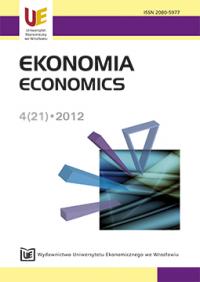Uwarunkowania rozwoju kapitału intelektualnego w kontekście sytuacji finansowej jednostek samorządu terytorialnego
Determinants of development of intellectual capital in the context of financial condition of self-government entities
Author(s): Małgorzata WosiekSubject(s): Economy
Published by: Wydawnictwo Uniwersytetu Ekonomicznego we Wrocławiu
Keywords: social services; local self-government; intellectual capital
Summary/Abstract: The aim of the study is to indicate the results of deteriorating condition of public finance for the ability to fulfill socio-economic tasks by local self-governments (gminas, powiats, voivodeships). The attention is focused on activities that create possibilities for the development of intellectual capital of local societies – that is social services (education, health care, culture) as well as on an investment activity. The discussion was aimed at verification of the hypothesis assuming that different kinds of expenditure directed at development of intellectual capital responded to the decreasing financial potential of self-governments with different sensitivity. The conclusions were based on an analysis of dynamic and structure of budget revenue and expenditure as well as on the level of debt of self-governments within the years 2007–2011, in the background of tendencies observed after 1999. The increasing debt and deficit of public finances within years 2007–2011 were reflected by a lower potential of expenditure of local self-governments and by the implementation of additional system barriers for the fulfillment of socio-economic tasks by the entities. Cuts were also present in a dimension of activities that support development of intellectual capital of local societies. The most serious limits were put on cultural expenditure, that are, as a matter of fact, of a minor importance for local development. However, in the sphere of social services the scale of reduction in pro-development expenditure brings concern – it is more than twofold higher compared with changes in total investment expenditure. Education expenditures are characterised by the relatively highest resistance to the revenue decrease. In their case, however, a problem of some kind of helplessness in rationalisation of their structure appears. The phenomena are cha-racteristic for all levels of self-government administration. In the existing condition, local self--governments should search for realistic solution to the problem not by the reduction of pro-development investment expenditure but by increasing the functionality of current expenditure.
Journal: Ekonomia
- Issue Year: 2012
- Issue No: 21
- Page Range: 258-274
- Page Count: 17
- Language: Polish

